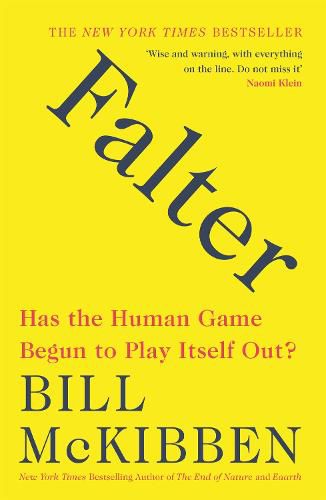Readings Newsletter
Become a Readings Member to make your shopping experience even easier.
Sign in or sign up for free!
You’re not far away from qualifying for FREE standard shipping within Australia
You’ve qualified for FREE standard shipping within Australia
The cart is loading…






‘This is Bill McKibben at his glorious best. Wise and warning, with everything on the line. Do not miss it’ Naomi Klein, author of This Changes Everything and The Shock Doctrine
Thirty years ago, Bill McKibben wrote The End of Nature, the first book that alerted us to the dangers of climate change. Falter is a new call to arms, to save not only our planet but our very souls as well.
Over tens of thousands of years, through the harnessing of nature, the development of civilization, and the application of new technologies, human beings have created the world we live in. But as McKibben points out in this provocative and sobering look at the world today, we are fast approaching a tipping point, putting into question the viability of humanity itself.
McKibben argues that we have failed to recognize how individual actions often operated against our collective interest, and as a result we now face three daunting challenges - to adjust to a new life on a broken planet, to fight the hyper-individualism that now animates government and business; and to reverse the ways that technology is bleaching out the variety of human existence. He asks if we still retain the tools and social capital to fight these larger forces - and if we are willing to make the effort.
$9.00 standard shipping within Australia
FREE standard shipping within Australia for orders over $100.00
Express & International shipping calculated at checkout
Stock availability can be subject to change without notice. We recommend calling the shop or contacting our online team to check availability of low stock items. Please see our Shopping Online page for more details.
‘This is Bill McKibben at his glorious best. Wise and warning, with everything on the line. Do not miss it’ Naomi Klein, author of This Changes Everything and The Shock Doctrine
Thirty years ago, Bill McKibben wrote The End of Nature, the first book that alerted us to the dangers of climate change. Falter is a new call to arms, to save not only our planet but our very souls as well.
Over tens of thousands of years, through the harnessing of nature, the development of civilization, and the application of new technologies, human beings have created the world we live in. But as McKibben points out in this provocative and sobering look at the world today, we are fast approaching a tipping point, putting into question the viability of humanity itself.
McKibben argues that we have failed to recognize how individual actions often operated against our collective interest, and as a result we now face three daunting challenges - to adjust to a new life on a broken planet, to fight the hyper-individualism that now animates government and business; and to reverse the ways that technology is bleaching out the variety of human existence. He asks if we still retain the tools and social capital to fight these larger forces - and if we are willing to make the effort.